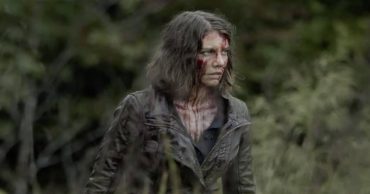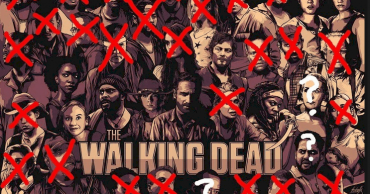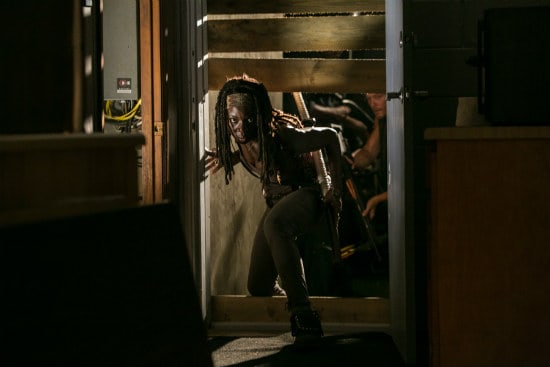
I’ve never been a huge fan of the “split-season” technique AMC’s employed with their signature series – especially on The Walking Dead, where an extended mid-season break limits the show’s potential ambitions for long-form storytelling. Though The Walking Dead is obviously able to have an overarching narrative, since the expansion to 16 episodes in season three,the show’s become six half-seasons of television: the Woodbury Trilogy (although it’s one long story, there are distinct beginnings and end to each arc), The Road to Terminus, and this season’s Exodus to Atlanta. And by having to crunch these stories down to eight episodes, things tend to get messy in spots – unfortunately for this season, that happens in “Coda”, which blazes through a number of important beats in order to deliver its “shocking” conclusion, never able to establish any kind of rhythm as it careens towards its final showdown.
Some of this has to be attributed to the episode’s running time: with only 42 minutes (and change), there’s not a lot of room for “Coda” to breathe, something the episode desperately fights against. It certainly tries to slow down for some emotional beats – but the episode’s attempts to draw parallels between Beth and Dawn don’t really fit neatly, given how little time we’ve spent with them at the prison. Yes, these are two women who have let themselves get a little bit darker in this new world – but that vague idea can be applied to anyone on the show, even Bob and Sasha, who talk on a rooftop about how they’re holding onto the good in themselves, even though it may be time for them to (a conversation we’ve heard many, many times before, I might add). It’s The Walking Dead‘s old go-to: and when the only reason it exists is to plow through some exposition and make some thin connection between Beth and Dawn to set up their final scene together, it doesn’t have the impact the episode wants it to be.
It’s a classic case of a script massaging emotions out of the audience: unlike some of the earlier, better episodes this season, “Coda” often goes too far into providing explanations for how we should be feeling. For example, did anyone think things would end well for Beth when Maggie starts asking about her? She hasn’t talked about her all season, and now she’s concerned about where she is – so overcome with emotion in fact, that she can barely speak. At some point, every show is guilty of emotional manipulation, but the paint-by-numbers design that “Coda” uses to achieve its desired emotional effect is not well-disguised- and ultimately, it lessens the impact of a main character’s death, already diminished by the inexplicable, completely orchestrated fashion in which her and Dawn meet their deaths.
When Beth all of a sudden goes full-kamikaze and stabs Dawn, the entire fabric of the story line falls apart: with Noah giving himself up, there was nothing left to fight for at Grady. We didn’t understand most of the characters (mostly a collection of police who liked to assault women, and “the good guys” that were often named, but never seen), so their impact on the overarching story really doesn’t matter: in the end, it feels like a story constructed to kill off Beth, shoved into the space of five episodes, and often given second billing behind the stories of Father Gabriel, Carol’s return, and Rick’s sudden descent into homicidal madness (which is still a much better direction for the character than “peaceful gardener and farmhand” – at the very least, it gives him some existential appeal).
In the end, “Coda” shows that eight episodes wasn’t enough for an ambitious set of stories like this, which posited a number of interesting new angles for characters to explore their new identities post-prison/Terminus… and then could only deliver on a few of them. Even Tyreese and Sasha’s conversation in this episode suffers from this; Tyreese’s decision to let Martin live and Sasha’s decision to trust Bob are not really two comparable situations, even though they both tug at the issues of identity at the core of The Walking Dead‘s recent string of episodes. Tyreese’s actions were out of an attempt to protect his soul; Sasha’s was just stupid, an event seemingly constructed to bring a running Bob 2.0 into Rick’s awaiting arms – and when “Coda” tries to unite the two moments, it feels like the rest of the episode, under-cooked and tossed in to serve as a placeholder for the show’s more interesting internal examinations.
Instead, it finishes loud and fast: no sooner is the tense exchange over before it goes sideways, and Daryl ends up carrying Beth’s limp body out of the hospital with tears in his eyes. Yes, it’s a heart-wrenching scene to see everyone process Beth’s death… but that’s the only heartbreaking part about it, ultimately a story lacking in any kind of emotional poignancy because of how little time her relationship with Dawn was able to grow (even if she hated Dawn, it made Beth challenge who she was as a human being in Grady). It also ends up having little effect on the story when Rick decides they should leave the hospital – in the end, it feels like an exchange gone wrong, with two deaths somehow cancelling each other out, even though one of the deceased was a character we’d spent the last four seasons with.
Acting as a mid-season finale, “Coda” is mostly an hour of unevenly-paced narrative, highlighted by a final act that abandons the season’s slow-burning narrative to get to its signature moment of shock, which removes a main character from the show with literally no impact on the overall narrative (anyone willing to bet we’ll never see the non-people of Grady ever again?). And the most frustrating part is that none of it had to happen at all; Beth and Dawn didn’t have to die, and Gabriel didn’t have to stupidly destroy the church as a temporary home for everyone by leading a bunch of walkers to Michonne, Judith, and Carl (seriously Gabriel… you’re an idiot)… but all these things do happen, revealing The Walking Dead may have gotten better this season, but it still really hasn’t changed. For all its ambitious choices in season five, it’s still a show that bows to audience expectations: a “finale” means that something huge has to happen, something “Coda” clearly feels the pressures from. And unfortunately, it ends The Walking Dead‘s 2014 (it’s best year to date, by far) on a surprisingly sour note, the collapse of Atlanta in the background of the episode’s final shot a surprisingly neat parallel to the destruction of promising narrative in the foreground.
 Follow Us
Follow Us





